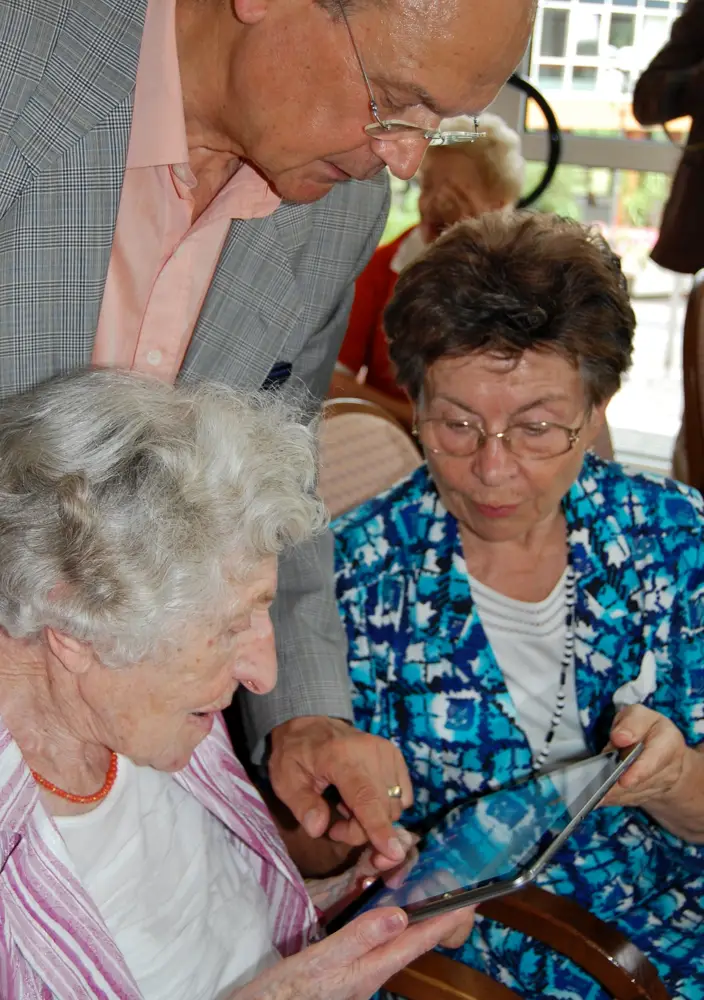Older adults today are exploring a host of AI-powered tools that can make daily life easier, from voice assistants to chatbots. Across the country, “scores of [classes] have sprung up” to teach seniors about AI. In one Illinois class, a retired professor called AI “probably the greatest technical revolution that I will see in my lifetime,” as she learned about ChatGPT and other tools. Programs like Michigan’s GetSetUp have made AI for seniors training easy and accessible across Michigan.
AI Devices Can Control Household
Voice-activated assistants – like Amazon’s Alexa, Apple’s Siri, or Google Home – let users control gadgets and get information hands-free. These devices can answer questions, play music, set timers, and even control smart lights or thermostats by voice. For example, a Google Home speaker can dim lights or play a favorite song when asked.
Research shows many older adults find these assistants easy to use: one study found seniors’ “first response to a voice assistant was positive, thanks to the simplicity of a speech-based interaction.” Voice assistants have also been studied as tools for aging in place. In one program, seniors reported that Alexa gave them a sense of companionship and security, and its reminders helped with daily tasks. In a 12?week exercise program, all 15 participants (ages 60–89) completed workouts guided by an Alexa device, reporting the system was “user-friendly, convenient…and enjoyable.”

Many prefer using AI for Seniors because it simplifies daily tasks and enhances their interactions with technology. Generative AI chat tools are another new frontier. Seniors utilizing ChatGPT and similar programs can draft emails, answer questions, or write stories. Some tech centers now offer free classes just for seniors.
For example, AARP’s Senior Planet runs online workshops to “make the most out of ChatGPT and other AI software.” A Michigan public library hosted a class promising “practical benefits” of ChatGPT, such as generating personalized text in seconds. After attending such courses, seniors have started experimenting with AI at home. One 89-year-old told the AP that she “eventually queried ChatGPT about how to treat a personal medical ailment” after a workshop. (Experts caution that AI health advice should be checked carefully.)
Smart health and safety devices are growing more advanced too. Wearable monitors and apps can track heart rate, steps, and sleep. Studies show simple fitness trackers are easy for many seniors to use and can boost activity levels. More sophisticated devices like the Apple Watch include automated fall detection: if a hard fall is sensed, the watch can call emergency services.
Researchers note that wearables “could help monitor falls, alert caregivers…and predict falls.” Many older adults welcome these tools: studies find seniors generally want to stay independent and are “willing to accept new technologies that support their independence”. In practice, 80% of people over 65 wear a personal emergency alert device at some point, though some hesitate to use it.
Medication reminders and apps also help. A recent trial found that using an easy drug-management app “can improve drug adherence, reduce adverse events and pave the way for better disease management” among seniors taking many prescriptions. Simple voice features in smart assistants can set pill alarms too.
Getting Started: Free Classes and Community Help

Seniors curious about AI don’t have to dive in alone. There are many no-cost or low-cost resources and classes. AARP’s Senior Planet program offers free online tech classes nationwide, from basic internet skills to AI topics. GetSetUp, an online learning platform for older adults, partners with Michigan to provide thousands of free peer-led classes. Michigan’s health department reports that nearly 268,000 seniors took GetSetUp classes, on topics from fitness to “how to use popular software programs and apps.” One state health official said making GetSetUp “available for all residents at no cost…helps them live happy, healthy and engaged lives.”
Local libraries and senior centers often host workshops on technology. For example, a library in Trenton, MI, advertised a “Practical, User-Friendly AI Class for Older Adults,” promising to explore “the practical benefits of using…ChatGPT” for writing letters or solving problems. Nonprofits like Cyber-Seniors connect seniors with tech-savvy student volunteers. Cyber-Seniors offers free phone and video help and webinars on everything from online browsing to health apps.
Benefits and Cautions: What Experts Say
Experts say AI offers real benefits for older adults but comes with risks. On the upside, AI tools can boost safety and social connection. Voice assistants can remind users of appointments or bridge distances by calling family on command. Chatbots can help with writing or answer questions when family isn’t around.
AI for Seniors has proven to be a helpful companion, aiding seniors in maintaining their independence. “This technology offers new possibilities for people with sensory, physical, and cognitive challenges,” note researchers at the University of Maryland, because voice control can overcome barriers like small buttons or poor eyesight. Seniors have reported using voice assistants to look up health information, check the weather, or stream music, and they appreciate the “efficiency and convenience” of speaking rather than typing.
Utilizing AI for Seniors leads to enhanced learning opportunities. Specialists warn seniors to stay vigilant. Studies show older adults trust AI-generated information less than younger people. A University of Michigan poll found that about 74% of adults over 50 would have little or no trust in health information if AI generated it. Nearly a quarter of seniors admitted they lack confidence in spotting false health information online. Experts emphasize that seniors should double-check AI advice, especially on important topics like finance or medicine. “Helping older adults better understand AI-generated information…may help address these concerns,” recommended a recent study.
Security A Concern For Seniors
Security is another concern: scams and deepfakes powered by AI have targeted the elderly. One analysis warned seniors may be more susceptible to fraud and online misinformation fueled by artificial intelligence. To balance benefits and risks, trainers advise a healthy skepticism. As one instructor told an AP reporter, “Overall, the suspicion on the part of seniors is good – but I don’t want them to become paralyzed from their fears.” In other words, seniors should learn to use AI tools and enjoy their help, while remaining cautious.
As AI for Seniors becomes more prevalent, its impact on daily routines is becoming increasingly significant. “By gaining skills with these technologies, older adults can open new doors,” says Dr. Natasha Bagdasarian of Michigan’s health department. Programs like GetSetUp have given hundreds of residents “valuable resources to combat social isolation and access new knowledge, significantly improving their quality of life.” With user-friendly tools, supportive classes, and a bit of guidance, tech-curious seniors can leverage AI to stay connected, informed, and safe.




